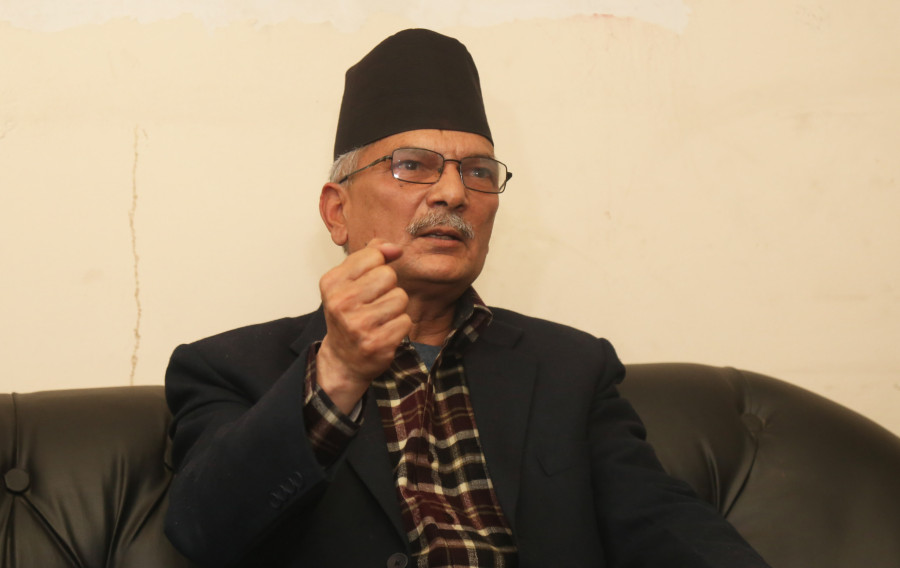Interviews
Baburam Bhattarai: Our mission is to create a new force based on an alternative ideology
Chairman of Samajbadi Party on countering traditional parties like the Nepal Communist Party and Nepali Congress.
Tika R Pradhan
Baburam Bhattarai, former prime minister and one of the ‘architects’ of the decade-long Maoists insurgency in Nepal, is currently in the midst of attempting to provide, what he calls, an 'alternative force' in the country. Having abandoned Pushpa Kamal Dahal and the CPN (Maoist Centre) as soon as the new constitution was promulgated in 2015, Bhattarai went on to form Naya Shakti, which has now merged with the Sanghiya Samajbadi Forum to form the Samajbadi Party. Tika R Pradhan spoke to Bhattarai about contemporary politics and Nepal’s relations with its neighbours.
This interview has been condensed for clarity.
You formed Naya Shakti by deserting Maoist party, and now you’ve joined hands with yet another older force. What’s your experience building an alternative force in Nepal?
Under my leadership, we waged a people’s war to turn Nepal into a federal democratic republic. That struggle led the nation to this point, which I am proud of. Now the country has reached a new era, and the world has reached a new place. Entering into a new phase warrants a new ideology that goes further than capitalism and communism. A new type of socialism, based on inclusiveness and participatory democracy, is our agenda in the present context. We created Naya Shakti based on that agenda. Naya Shakti was not the name of a party but the concept for a new force. We are joining hands with other like-minded parties and forces.
Are you creating an alternative force or an alternative to the existing parties?
Our mission is to create a new force based on an alternative ideology. We neither follow capitalism nor communism but socialism based on inclusive and participatory democracy. Therefore, we’ve called our new party Samajbadi Party.
The Nepal Communist Party and Nepali Congress both claim to follow socialism. What is the difference then?
The Nepali Congress is a capitalist party, but it has been trying to add some features of social welfare while the Nepal Communist Party is a communist force. We have decided to follow socialism too, but it will not just be an ideology for us—it will be a goal. We are not for indirect democracy but a direct one where the president is directly elected by the people. Nepali Congress is in favour of indirect democracy while communism by name means a dictatorship of the proletariat. If the Nepal Communist Party is not in favour of this then, they should change the definition established by Karl Marx. They call themselves a ‘communist’ party, which is not compatible with socialism. We are for a new type of socialism based on inclusion and participation.
What about your party’s unification process?
Our unification process is tied together by inclusion. The Congress and the communists are dominated by one caste. We are for a directly elected presidential system instead of the existing parliamentary system—a fully proportional parliament and a directly elected president. If we follow this model, we can resolve Nepal’s current problems and we will unite with the forces who support this agenda.
Unification takes time. Naya Shakti was in constant talks with Sanghiya Samajbadi Forum for two years before the parties merged. We are in touch with Rastriya Janata Party and discussions are progressing positively. Dialogues will reach a logical conclusion soon.
Will the Samajbadi Party quit the government?
If we want to be an alternative force, we cannot remain in the government. The then Sanghiya Samajbadi Forum had joined the government to ensure a two-thirds majority as it was necessary to amend the constitution. Now, after almost two years in the government, nothing has been done. We will request the ruling party one last time but I don’t think they will amend the constitution. At that point, we will take to the streets. We will quit the government while the unification process with the Rastriya Janata Party continues.
Why do you think the ruling Nepal Communist Party is failing to deliver on its promises?
A major reason is that they have lost the willpower and are no longer revolutionary. Second, they have failed to change their monolithic thinking. They are also confused about which sector should be allowed for private companies and which sector the government should look after. What’s more, they also do not have the necessary skills to run the state properly. They lack the vision to change the existing machinery according to the needs of the changing context.
How do you evaluate the KP Sharma Oli administration's foreign policy?
Foreign policy is not a personal issue; it is something that the nation develops by keeping its interests in mind. Oli’s decisions are guided by his personal and partisan interests, rather than the broader national interest. Nepal’s dignity has been affected because Oli kept on changing policies, and the country has lost the confidence of the international community. Located between two giants, we should develop Nepal as an economic bridge to India and China. But since there is no clear vision, we lack clarity in our foreign policy.
So you mean Oli has failed to balance relations with our neighbours and other power centres?
The Oli-led government has yet to come to terms with the changes in the dynamics of foreign relations and regional balance of power. Nepal could not make the necessary preparations to present our policies clearly and convince India, China or the United States properly. If we can assure that Nepal won’t be going against the interest of any of our friendly nations, we can receive benefits from our immediate neighbours and America.
You were once prime minister. What steps did you take when you were in power to address these deficiencies?
The situation was different when I was prime minister. The country was focused on drafting a new constitution and on the verge of concluding the peace process wherein the Maoist fighters were to be integrated into the Nepal Army. Yet, I always maintained it was essential to balance our relationship with India and China by correctly assessing the changed relationship between the two neighbours. China is rising as a superpower and India has also been making much progress. What’s more, America, the world power, is once again showing its concern for this region after the 1960s. We need to see this situation, where three giants are showing interest, as an opportunity.
Many people called President Xi Jinping’s visit as a historical moment, but you said that there was no need to be so elated. Why was that?
The arrival of any powerful and prestigious guest is always good. But we need to define our relations in a new manner. When I was prime minister, Chinese premier Wen Jiabao, during his visit to Nepal, clearly told me that Nepal needs to have clear policies vis-a-vis India and China. This time too, Chinese President Xi Jinping came to Nepal only after meeting the Indian prime minister in Mahabalipuram, India, which in itself is a clear message to Nepal to not pit one against the other. China knows that they won’t benefit from railways with Nepal if the track does not link to the Indian market. So China will wait until it gains India’s trust. We must understand that.
How do you assess the agreements made with China?
In general, the 14-point joint communique and 20 agreements signed by the government are good. Politically, the developments are positive. It’s good that China has agreed to support Nepal in its endeavour to become land-linked. Albeit symbolic, it will have long-term significance. Second, by using the phrase ‘strategic partnership’ instead of ‘comprehensive partnership’, China wishes to lift relations with Nepal to a new height. But we need to know whether that includes military and security issues, for they could invite controversies. However, the agreements lacked substance and were not on par with the way they were published.
You have talked about not taking a loan for railways. Is it possible to build a railway without seeking a loan from China?
We should accept soft loans to develop the necessary infrastructure. But constructing railways across Chinese borders is a very costly project. Tibet in itself is not a big market for China, and the railway needs to cross the Himalayas to reach here. If we construct the railway with loans, economic activities won’t be sufficient to ensure its returns. It would be more prudent to receive some parts as loans and some as grants. China is a big country and also the one to benefit more from the construction of a railway. So it only make sense for them to invest more.
***
What do you think?
Dear reader, we’d like to hear from you. We regularly publish letters to the editor on contemporary issues or direct responses to something the Post has recently published. Please send your letters to [email protected] with "Letter to the Editor" in the subject line. Please include your name, location, and a contact address so one of our editors can reach out to you.




 14.12°C Kathmandu
14.12°C Kathmandu




.jpg&w=200&height=120)








